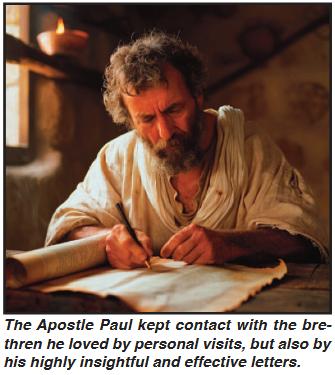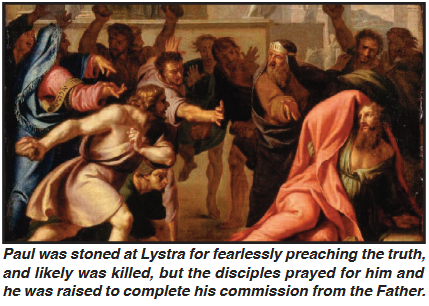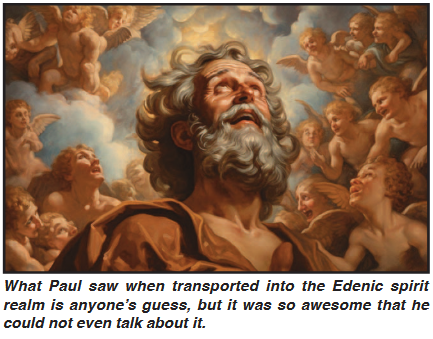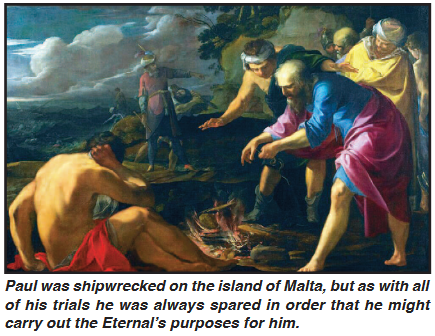
Enduring Through Trials — Paul’s Powerful Example
Can We, Like Him, Walk Faithfully in Christ’s Footsteps?
There are many examples of people throughout the Bible who are champions of righteous living, whom we look up to with great admiration. We know of Enoch, Noah, Abraham, Isaac, Jacob, Moses, David, the prophets, and then the Savior Himself, Jesus Christ, who set the ultimate example for righteous living for everyone.
During the time of Jesus we also take note of the disciples, who weathered the attacks of the Pharisees, scribes, and others of the Judaic establishment. One of the most prominent disciples was the latecomer, Paul of Tarsus. He endured incredible hardships while carrying out his commission to spread the word of God to not just the Israelite people of Palestine and elsewhere, but also to the gentile people in Asia Minor and southern Europe.
Let us take a close look at the records we have of Paul’s service to the brethren that the Father called in the mid-First Century A.D. This incredibly important figure on the scene of early Christianity will be proven to be a marvelous inspiration to us all!
He Was Focused On the Future
 Paul made an astounding statement to the Philippians about how we are to view our journey here on earth. So often we are prone to looking back in time to view our accomplishments and experiences, some of which are good and some not so good. Paul was emphatic concerning the view we should take: be forward-looking towards the hope of the resurrection that we have on ahead … and more than hope, but the promise of life eternal alongside our elder brother Jesus Christ, who even now is at the right hand of the Father in heaven.
Paul made an astounding statement to the Philippians about how we are to view our journey here on earth. So often we are prone to looking back in time to view our accomplishments and experiences, some of which are good and some not so good. Paul was emphatic concerning the view we should take: be forward-looking towards the hope of the resurrection that we have on ahead … and more than hope, but the promise of life eternal alongside our elder brother Jesus Christ, who even now is at the right hand of the Father in heaven.
“Not that I have already attained [the resurrection], or am already perfected; but I press on, that I may lay hold of that for which Jesus Christ has also laid hold of me. Brethren, I do not count myself to have apprehended; but one thing I do, forgetting [epilanthanomai, ‘forget or neglect’] those things which are behind and reaching forward to those things which are ahead, I press toward the goal for the prize of the upward call of God in Christ Jesus” (Philippians 3:12-14).
In Hebrews 12:1 Paul emphasizes the need to throw off any encumbrance, like a marathon runner who through 26 miles of exertion must keep going in spite of one’s muscles aching and crying for relief. You do not quit in spite of the pain, for Paul clearly recognized that the prize was worth every last bit of effort and discomfort. Not only that, but in I Corinthians 9 he again likened our calling to running a race in such a way that will gain the prize of winning! As he stated, in verses 25-27,
“And everyone who competes for the prize is temperate in all things. Now they [those not in the ecclesia] do it to obtain a perishable crown, but we for an imperishable crown. Therefore run thus: not with uncertainty. Thus I fight: not as one who beats the air. But I discipline my body and bring it into subjection, lest when I have preached to others, I myself should become disqualified.”
To the Galatians Paul assured that they must “not grow weary in well-doing,” and not give up as they pressed forward, for in due time they would reap the harvest of eternal life (Galatians 6:9). He made it plain that our sight must be focused on the long-haul, which requires great day-to-day endurance (Romans 5:3-4; II Corinthians 4:17), even as David (Psalm 27:14), Peter (I Peter 5:10), and Jesus Himself emphasized this point: “But he who endures to the end shall be saved” (Matthew24:13).
Even secular people understand the essentiality of perseverance on into the future to accomplish any worthwhile task … and there is no task more critical then achieving the resurrection of the firstborn!
“Most of the important things in the world have been accomplished by people who kept on trying when there seemed to be no hope at all.” Dale Carnegie
“Never give in. Never give in. Never, never, never, never — in nothing, great or small, large or petty — never give in, except to convictions of honor and good sense.” Winston Churchill
He Was Fearless Before Men
We are all very familiar with Paul’s reminder to Timothy, “For God has not given us a spirit of fear, but of power and of love and of a sound mind” (II Timothy 1:7). Paul was highly taught in the Torah and the Teachings and Prophets, having been educated at the feet of Gameliel (Acts 22:3), so he was very familiar with David’s words in Psalm 146:3-4:
“Do not put your trust in princes, nor in the son of man, in whom there is no help. His spirit departs, he returns to the earth; in that very day is plans perish.”
 “The fear of men brings a snare, but whoever trusts in the Lord shall be safe” (Proverbs 29:25), and again, “The Lord is on my side; I will not fear. What can man do to me?” (Psalm 118:6). This latter verse Paul quoted in Hebrews 13:6.
“The fear of men brings a snare, but whoever trusts in the Lord shall be safe” (Proverbs 29:25), and again, “The Lord is on my side; I will not fear. What can man do to me?” (Psalm 118:6). This latter verse Paul quoted in Hebrews 13:6.
Paul’s actions throughout the Book of Acts reveals this fearlessness. Notice the following episodes:
• In Lystra, Paul healed a man and preached Christ, leading the populace to want to worship him and Barnabas as gods. Then Jews from Antioch and Iconium arrived and convinced the crowd to stone and kill Paul. He very likely was actually killed, but after the disciples gathered around him and prayed, he rose and returned to the city, and the next day accompanied Barnabas to Derbe (Acts 14:8-20).
• In Philippi, Paul commanded a demon to leave a certain slave girl who was making much profit for her master by fortune-telling. These people then brought city magistrates into the fray, and a multitude of people rose up against them and had them beaten with rods and thrown into prison. That night, as Paul and Silas were praying and singing hymns, their shackles were loosened and the prison doors were opened (Acts 16:16-26).
• At Ephesus, a silversmith named Demetrius, who made silver shrines for the goddess Diana, feared for his work because of Paul’s preaching, and stirred up the city against Paul and his companions. Paul was not deterred by this uproar, but continued on with his visits to Macedonia and beyond.
There are other events where Paul was confronted by people who wanted to silence his preaching. Yet, he never backed down from his commission to preach the gospel, even when threatened with death by his adversaries. Fear of men was not a part of his character, a trait that the Eternal granted him in order that the Father’s will should be done.
He Understood His Shortcomings
 It is easy to look upon a person like Paul and his accomplishments, and idolize him as someone “bigger than life.” We can afford to do that with Jesus Christ, but hardly can a disciple such as Paul, with his human nature, be lionized in a similar way. In fact, Paul freely admitted his shortcomings, in particular in Romans chapter 7:
It is easy to look upon a person like Paul and his accomplishments, and idolize him as someone “bigger than life.” We can afford to do that with Jesus Christ, but hardly can a disciple such as Paul, with his human nature, be lionized in a similar way. In fact, Paul freely admitted his shortcomings, in particular in Romans chapter 7:
“For we know that the law is spiritual, but I carnal, sold under sin. For what I am doing, I do not understand. For what I will to do, that I do not practice; but what I hate, that I do …. I find then a law, that evil is present with me, the one who wills to do good. For I delight in the law of God according to the inward man. But I see another law in my members, warring against the law of my mind, and bringing me into captivity to the law of sin which is in my members. O wretched man that I am! Who will deliver me from this body of death? I thank God — through Jesus Christ our Lord! So then, with the mind I myself serve the law of God, but with the flesh the law of sin” (Romans 7:14-15, 21-25).
We know that Paul had a “thorn in the flesh,” a “messenger of Satan” to torment him as it were, for which he pleaded with God three times to remove it. As a result of these pleadings the Father responded, “My grace is sufficient for you, for My power is perfected in weakness.” As a result of that answer, Paul responded that he would gladly boast in his weakness so that Christ’s power would rest on him (see II Corinthians 12:7-10). He also stated that he would boast of things that show his weakness (II Corinthians 11:30).
In fact, he rather gloried in his infirmities, as he wrote in I Corinthians 2:3 that “I came to you in weakness and fear, and with much trembling.” This message was not with persuasive words of wisdom but with a demonstration of the spirit’s power. He even admitted that his letters were weighty and forceful, but his physical appearance was unimpressive, and his speaking was contemptible [exouthenemenos, “to make of no account, to despise utterly”] (II Corinthians 10:10).
Paul clearly recognized his own shortcomings and was not shy about talking about them to the brethren. He set a perfect example of what we brethren are to do: “Confess your sins one to another and pray for each other” (James 5:16). Paul was not afraid to admit his shortcomings, even if he belittled himself in order to encourage and uplift the brethren.
He Had Total Faith and Trust in the Eternal
One does not have to read very far into Paul’s letters before concluding that this man of God put his total faith and trust in the Creator’s hands. He knew Jesus intimately, first on the road to Damascus, where he was struck blind for three days. At Damascus, Ananias was told to meet Paul and lay hands on him that he might receive the holy spirit and be given back his sight. After Ananias expressed his own concern about this opposition leader of Christians, Jesus told him:
 “Go for he is a chosen vessel of Mine to bear My name before gentiles, kings, and the children of Israel. For I will show him how many things he must suffer for My name’s sake” (Acts 9:15).
“Go for he is a chosen vessel of Mine to bear My name before gentiles, kings, and the children of Israel. For I will show him how many things he must suffer for My name’s sake” (Acts 9:15).
Besides, Paul intimated that he had been in Arabia for a time (Galatians 1:17), and perhaps this is when he was “caught up to the third heaven” — whether in vision or in actual bodily transport — caught up to Paradise [paradeisos, “a park, an Eden”] where he “heard inexpressible words, which it is not lawful for a man to utter” (II Corinthians 12:2-4). He had personal contact with Christ and thus understood the incredibly pure and powerful nature of God.
Because of this understanding he was able to voice his complete faith in God with statements like these:
“… but the spirit itself makes intercession for us with groanings which cannot be uttered, Now He who searches the heart knows what the mind of the spirit is, because it makes intercession for the saints according to the will of God. And we know that all things work together for good to those who love God, to those who are the called according to His purpose” (Romans 8:26-28).
Paul continued on to the end of chapter 8 by saying, “If God is for us, who can be against us?” (verse 31), assuring the brethren that if the Father did not spare His own Son from crucifixion, He would also freely give us eternal life! Moreover, nothing could separate us from the love of God: death or life, angels or principalities, things present or things to come, height or depth — anything (verses 35-39)!
Shortly before Paul’s death at the hands of the Roman Emperor Nero, Paul stated his confidence that he had endured to the end and would achieve the first resurrection, as we can read in II Timothy 4:7-8:
“I have fought the good fight, I have finished the race, I have kept the faith. Finally, there is laid up for me the crown of righteousness, which the Lord, the righteous Judge, will give me on that Day, and not to me only but also to all who have loved His appearing” (see also James 1:12).
Because of that infinite love, faith, and trust in the Creator, Paul was able to endure every sort of affliction thrown at him, as we shall see in the next section.
He Had No Fear of Suffering for Christ
The apostle Paul endured incredible trials for the sake of his calling that would have turned away most anyone else from such efforts. Yet, to him these trials were just part of the pain he was more than willing to endure, for he knew these painful experiences were as nothing compared to the glory he would experience as God’s resurrected son.
“The spirit itself bears witness with our spirit that we are children of God, and if children, then heirs — heirs of God and joint heirs with Christ, if indeed we suffer with Him, that we may also be glorified together. For I consider that the sufferings of this present time are not worthy to be compared with the glory which shall be revealed in us: (Romans 8:16-18).
Look at some of the afflictions that Paul endured through his service to God. These listed below are mentioned in II Corinthians 11:23-28):

- Imprisonments
- Stripes five times, 40 less one
- Beaten with rods, three times
- Shipwrecked and adrift on the sea
- In perils from drowning, robbery, Israelites, and gentiles
- Perils in the sea, wilderness, and among false brethren
- Sleepless nights, weariness, hunger, thirst, fasting, cold, and nakedness
- Deep concern for all the congregations
Paul understood that trials and pain produced growth in character, as he stated in Romans 5:3-5:
“And not only that, but we also glory in tribulations, knowing that tribulation produces perseverance; and perseverance, character; and character, hope. Now hope does not disappoint, because the love of God has been poured out in our hearts by the holy spirit which was given to us.”
While suffering from a “thorn in the flesh,” he asked Christ three times to be healed, but when he was told that “My strength is made perfect in weakness,” he boldly stated that he “will rather boast in my infirmities, that the power of Christ may rest upon me (II Corinthians 12:7-9). Then Paul stated profound words:
“Therefore I take pleasure in infirmities, in reproaches, in needs, in persecutions, in distress, for Christ’s sake. For when I am weak, then I am strong” (II Corinthians 12:10).
Paul knew that with his calling came suffering, not just to uplift his character — for humility thrives under persecution, and one can only approach the Father when humble (Isaiah 66:2) — but because suffering is required for salvation. “… if indeed we suffer with Him … we may also be glorified together” (Romans 8:17). The outward, physical man is perishing, and this “light affliction” that he knew was for but a moment compared to eternity in a spirit body, that affliction which “… is working for us a far more exceeding and eternal weight of glory” (II Corinthians 4:16-17).
He Was Content
Perhaps more than anything Paul was content with the state of life in which he found himself. He recognized that whether he was rich or poor, slave or free, uplifted or downtrodden, these qualities were all as nothing compared to the glory as a resurrected son of God which was his goal in life. He stated so eloquently in Philippians 4:11-13:
“Not that I speak in regard to need, for I have learned in whatever state I am, to be content: I know how to be abased, and I know how to abound. Everywhere and in all things I have learned both to be full and to be hungry, both to abound and to suffer need. I can do all things through Christ who strengthens me.”
These thoughts Paul repeated in I Timothy 6:6-8:
“Now godliness with contentment is great gain. For we brought nothing into this world, and it is certain we can carry nothing out. And having food and clothing, with these we shall be content.”
He cautioned against loving money and striving to be rich in material goods, for those who do “fall into temptation and a snare, and into many foolish and harmful lusts which drown men in destruction and perdition” (I Timothy 6:9). Contentment is to be satisfied with what you have and not be fearful of not having enough, for the Eternal has promised, “I will never leave you nor forsake you” (Deuteronomy 31:6; Hebrews 13:5). Paul understood very well the words that Christ spoke in Matthew 6:25-34:
“Therefore I say to you, do not worry about your life, what you will eat or what you will drink; nor about your body, what you will put on. Is not life more than food and the body more than clothing? Look at the birds of the air, for they neither sow nor reap nor gather into barns; yet your heavenly Father feeds them. Are you not of more value than they? Which of you by worrying can add one cubit to his stature? So why do you worry about clothing? Consider the lilies of the field, how they grow: they neither toil nor spin; and yet I say to you that even Solomon in all his glory was not arrayed like one of these. Now if God so clothes the grass of the field, which today is, and tomorrow is thrown into the oven, will He not much more clothe you, O you of little faith? Therefore do not worry, saying, ‘What shall we eat?’ or ‘What shall we drink?’ or ‘What shall we wear?’ For after all these things the gentiles seek. For your heavenly Father knows that you need all these things. But seek first the kingdom of God and His righteousness, and all these things shall be added to you. Therefore do not worry about tomorrow, for tomorrow will worry about its own things. Sufficient for the day is its own trouble.”
Paul Endured — So Must We Endure
The example of Paul enduring through trials parallels the sufferings of Jesus Christ. In fact, he compared Christ’s sufferings directly to our own sufferings,
“I have been crucified with Christ; it is no longer I who live, but Christ lives in me; and the life which I now live in the flesh I live by faith in the Son of God, who loved me and gave Himself for me” (Galatians 2:20).
“… and be found in Him, not having my own righteousness, which is from the law, but that which is through faith in Christ, the righteousness which is from God by faith; that I may know Him and the power of His resurrection, and the fellowship of His sufferings being conformed to His death” (Philippians 3:9-10).
Let us take this marvelous example of Paul’s life and use it as a catalyst to walk in the footsteps of Jesus Christ (I John 2:6)! Paul endured all of the trials placed before him, and persevered while encouraging all of us to do the same. Before his death he told Timothy, “I have fought the good fight, I have finished the race, I have kept the faith” (II Timothy 4:7). Then he gave this assurance:
 “Finally, there is laid up for me the crown of righteousness, which the Lord, the righteous Judge, will give to me on that Day, and not to me only, but also to all who have loved His appearing” (II Timothy 4:8; see also James 1:12)
“Finally, there is laid up for me the crown of righteousness, which the Lord, the righteous Judge, will give to me on that Day, and not to me only, but also to all who have loved His appearing” (II Timothy 4:8; see also James 1:12)
God’s Throne. What is it like? This artist made an attempt to depict it, but the entire heavenly landscape is likely much like Eden in its perfection.

